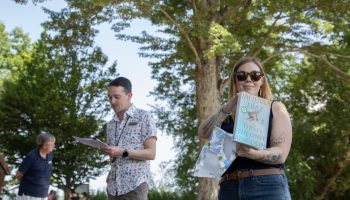
Sonnet. Diamante. Tanka. No poetic form is too daunting for Chautauqua’s young writers after their Book-in-a-Day experience.
This week, writers ages 9–12 gathered in the Literary Arts Center at Alumni Hall to explore different styles of poetry, craft their own work on the page, and edit it for print through the Young Writers Institute Book-in-a-Day workshop under the guidance of writing coaches and educators Ann Marie Stephens and Nikki Shannon Smith.
The four-day program is split into two phases: the first half is focused on learning and writing poetry, and the second half centers on editing and preparing the work for publication. The result is a professionally bound anthology, which will be available at the Chautauqua Bookstore by the end of the summer. At 12:15 p.m. today on the Alumni Hall porch, students will read from their work in a celebratory event.
Kwame Alexander, Newbery Award-winning author and Chautauqua’s Michael I. Rudell Artistic Director of Literary Arts and Inaugural Writer-in-Residence, created the program in 2006. Over the course of four years, he visited upwards of 80 schools to incorporate the program into the curriculum and spread a love of words to students from elementary to high school. Alexander collaborated with Stephens to develop a book instructing educators how to spread the Book-in-a-Day curriculum to their own classrooms.
In her first grade classroom, Stephens witnessed the power of the program firsthand. When one of Stephens’ students struggled with her emotions, poetry helped her regulate. When she felt overwhelmed, Stephens would ask her, “Why don’t you take a haiku hike?”
“She would take the hall pass, go in the hall, take one little lap around the school, come back and she’d have a haiku. … She understood the power of words, she understood that she was a poet, and that that was something that wasn’t gonna dissolve — no matter how mad she got or how old she got, that’s something that she could carry with her,” Stephens said.
Stephens now brings her experience to Chautauqua alongside fellow educator Smith. Together, they spent the week guiding students through a curriculum designed not just to teach poetry, but to inspire a lifelong love of writing. At the beginning of the workshops, Alexander gave students an overview of the day. The Young Writers Institute was established in 2018 but went dormant for several years; bringing the program back in 2025 served as an important milestone for Alexander.
“I wanted to bring that back to teach kids about writing, so I thought why don’t we not only teach them about writing, but how to publish a book as well? I’ve done that before and figured I could bring that here,” Alexander said.
On Tuesday, Alexander opened the class by asking if any of the students had eaten chicken before. Everyone raised their hands.
He asked them to imagine, if they were to attend a dinner and they bit into the chicken and tasted blood, would they return for another dinner party? Everyone shook their heads.
“Not if the chicken is still alive!” one student said. Other students nodded in agreement. The group was unanimous. If the chicken wasn’t cooked, they would not return for another meal.
“Much like a meal, poetry must be prepared properly,” Alexander said. “It must have the right ingredients. So, what are the ingredients that make a poem taste good?”
The class compiled a list of around 20 words highlighting the qualities of a poem that enticed them — from repetition to theme to form. After composing a haiku together with the class, each writer turned to their own paper with their pens and began writing on their own. Beginning each class with brainstorming and discussion allows students to feel more connected to their experience, Smith said.

“When we start diving into poetry, all of the groundwork of freedom and self-expression has already been laid, … so it’s really about creating lessons that are well-planted, flexible but layered so that the elements of poetry are being woven into the conversations, woven into exercises,” Smith said.
Through generative exercises such as drawing word maps and linking ideas together in conversation, students join forces to fill their minds with words before they even touch the page. For the event today, Smith said she looks forward to hearing from the students in the future and hopes they carry the words with them long after they publish the book.
“I hope that they will take away a love of words, a sense of playfulness with their words and a way to express themselves — whether it’s inside of the classroom or outside of the classroom,” Smith said. “… If they can love poetry on top of all of it, then that’s perfect.”




